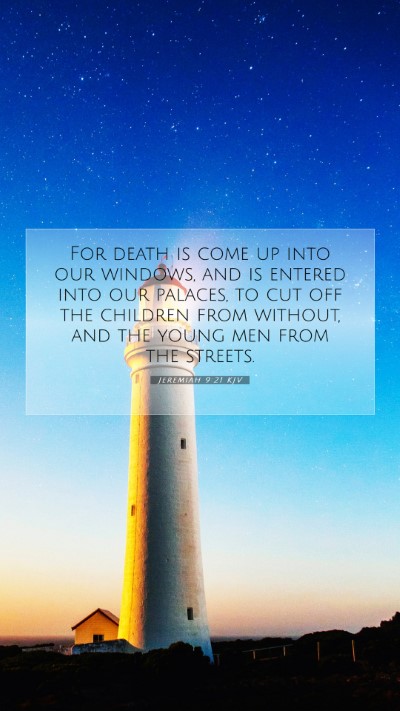Understanding Jeremiah 9:21: Commentary and Insights
Jeremiah 9:21 (KJV): "For death is come up into our windows, and is entered into our palaces, to cut off the children from without, and the young men from the streets."
This verse is a somber reflection on the devastation that the people of Judah are experiencing due to the impending judgments from God. Through the words of the prophet Jeremiah, we gain vital Bible verse meanings and Bible verse interpretations that address themes of mortality, societal decay, and divine retribution.
Commentary Insights
- Matthew Henry's Commentary:
Henry emphasizes the physical and spiritual implications of the effects of sin within the community. The mention of death 'coming up into our windows' suggests that calamity has infiltrated even the most private spaces of life, reflecting the unavoidable nature of divine judgment upon a disobedient society. This serves as a warning against complacency as destruction looms, reminding readers of the importance of repentance.
- Albert Barnes' Notes:
Barnes elaborates on the imagery of death as a grim intruder that not only affects the adults but also the innocent children. He connects the metaphor of death entering houses to the idea of divine judgment sweeping through the land, affecting all strata of society. This commentary reflects the urgency of turning back to God to avoid further tragedies.
- Adam Clarke's Commentary:
Clarke points out the parallel between this verse and the imminent Babylonian invasion that would devastate Jerusalem. Here, life is starkly juxtaposed with death, illustrating the terrible cost of sin. Clarke reinforces the call for deliverance and divine mercy as vital interpretations of this passage, urging readers to consider the significance of their actions and the consequences that come.
Thematic Elements
Collectively, these interpretations highlight several key elements: the significance of repentance, the reality of divine judgment, and the profound effects of societal sin. Furthermore, this verse encapsulates the despair felt by the people and emphasizes the need for recognition of their failures and the dangers they face as a community.
Biblical Exegesis and Application
When performing Biblical exegesis on Jeremiah 9:21, it becomes essential to consider the historical context surrounding Judah. The people lived in a time marked by idolatry, injustice, and widespread disregard for God's commandments, which all factor into the experiences portrayed by Jeremiah.
In terms of Bible study insights, this scripture can be applied to personal reflection on how external influences shape our inner life, and it challenges believers to safeguard their spiritual homes against moral decay.
Cross-References
- Lamentations 3:9: "He hath enclosed my ways with hewn stone, he hath made my paths crooked."
- Ezekiel 18:30: "Therefore I will judge you, O house of Israel, every one according to his ways, saith the Lord God. Repent, and turn yourselves from all your offenses; so sin shall not be your ruin."
- Matthew 24:19: "And woe unto them that are with child, and to them that give suck in those days!"
Conclusion
In conclusion, the understanding of Scripture in Jeremiah 9:21 provides profound insights into the state of human society in relation to divine law. This verse stands as a powerful reminder of the consequences of estrangement from God and encourages contemporary believers to recognize the need for moral vigilance, repentance, and communal integrity.
As you explore this verse further, consider discussing it within Bible study groups or using Bible study tools to delve deeper into its meanings. Reflecting on Jeremiah 9:21 can prompt meaningful discussions about how to apply such messages to daily life and the importance of collective responsibility in faith communities.
For those seeking to enhance their Bible study resources, this verse serves as a critical touchpoint for understanding the weight of divine judgment and the mercy offered through repentance.


